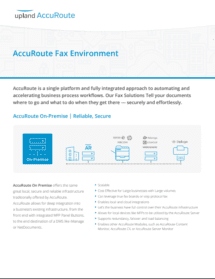
This is to make sure you don’t lose any important information in the event of a power outage.Īll of these protocols should be detailed and specific, and they should be reviewed and updated on a regular basis.

This might include using cloud-based storage solutions or keeping physical copies of important files and documents. If your business relies heavily on data and computers, you’ll need to have a solid plan for data backup and recovery. Your plan should also include provisions for customer communication, such as posting signs in your store or sending out email blasts to let them know you're still open for business.
#FAXDOCUMENT OUTAGE MANUAL#
This might include using generators to quickly restore power or using battery-operated point-of-sale systems or manual cash registers. For example, if you own a brick-and-mortar store, you’ll want a plan detailing how you’ll keep your doors open and transactions running. Once you’ve identified your most critical business functions, you can begin to develop procedures for maintaining them during a power outage. If you’re a service-based business, you’ll need to ensure your customer-facing employees have the tools and information they need to continue providing excellent service. These are the areas that you’ll need to focus on in your business continuity plan.įor instance, if you run a retail business, you’ll want to make sure you have a plan in place for keeping your registers and point-of-sale systems up and running. What are the chances of a power outage occurring, and how would it impact your business? After taking stock of your risks, identify the functions and processes that are critical to your business. To create an effective plan, you first need to assess your risks. Factors to consider when creating a power outage business continuity plan Once you’ve identified your critical systems, you can begin to develop procedures for maintaining them during a power outage. These will vary from company to company, but typically include things like security systems, computer networks, phone systems, and data backup. The most crucial part of any power outage business continuity plan is assessing which systems and processes are critical to your business.

There are a few key elements that should be included in your power outage business continuity plan. What should your power outage business continuity plan include? Power outages can also damage equipment, so it’s important to have a plan in place to protect your investments. It can also help you keep your customers and employees safe, and mitigate the financial losses that can occur when business is interrupted.

Having a power outage business continuity plan can help you minimize the impact of unexpected downtime. Although some businesses can operate without power, it’s necessary for most companies, particularly those that rely on computers and other electronic equipment. It includes procedures for everything from backup power generation to customer communication. What is a power outage business continuity plan?Ī power outage business continuity plan is a document that outlines how your business will continue to operate in the event of a power outage. That’s why it’s important to have a power outage business continuity plan in place so you can keep your business running smoothly, no matter what. It can happen anytime, anywhere, and often without warning. A power outage that causes significant disruptions is every business owner’s worst nightmare - no lights, no computers, and no way to conduct business.


 0 kommentar(er)
0 kommentar(er)
